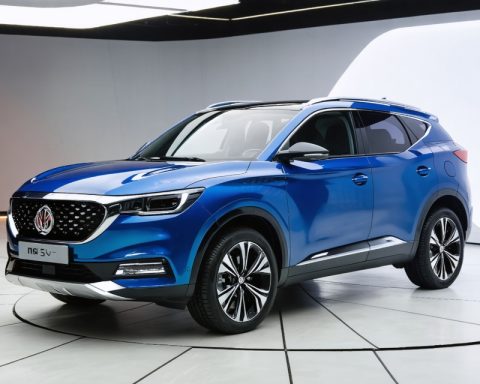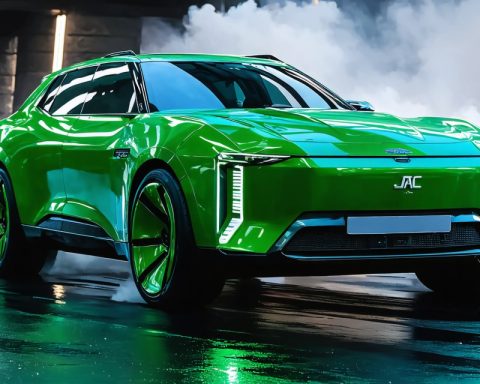- Electric vehicles (EVs) in the UK offer low emissions, reduced fossil fuel reliance, and potential yearly savings of £1,200 per owner.
- The UK Treasury will end EVs’ vehicle excise duty (VED) exemption, imposing a £195 annual tax from the second year of ownership.
- Luxury EVs over £40,000 face an additional £425 annual tax for five years, starting in year two of registration.
- The policy, initiated under the previous government and continued by the current one, aims to target high-polluting petrol cars but affects electric adoption.
- The Zev mandate encourages zero-emission vehicle production, yet the new taxes might deter potential EV buyers.
- Industry experts argue outdated policies hinder mainstream EV adoption.
- Treasury offers a temporary first-year duty freeze but concerns about cost increases and their impact on climate goals remain.
The sleek hum of electric vehicles heralding a green future is growing louder across the UK. The advantages of driving electric cars, especially in an environmentally conscious society, have been clear: lower emissions, reduced reliance on fossil fuels, and significant lifetime savings. The Energy and Climate Intelligence Unit (ECIU) highlights these benefits, with owners potentially saving around £1,200 annually compared to their petrol-driven counterparts. Yet, a sudden shift in policy threatens to dull this electric sheen.
This fiscal Tuesday, a disconcerting rev of apprehension can be heard as the UK Treasury brings an end to electric vehicles’ exemption from the vehicle excise duty (VED), commonly known as the car tax. All electric vehicle owners now face a standard rate of £195 starting from the second year of ownership—a rate that strains even further for luxury EVs valued over £40,000, incurring additional annual costs of £425 for five years, beginning in year two of registration.
Ironically, the changes are a quirk of continuity, conceived under the watch of the previous Conservative government, and seamlessly adopted by the current Labour leadership. The political baton pass has birthed a policy that doubles down on car emissions, with the heftiest fees reserved for the most pollutive petrol cars. Nevertheless, it’s the shift within the electric realm that surprises and concerns advocates.
The Zev mandate, a focal point in the UK’s EV evolution, pushes automakers to produce more zero-emission vehicles, catalyzing a drop in prices and an increase in variety. This new tax policy, however, could introduce static noise to the harmony of progress by nudging consumer confidence off-key. The spectacle of rising costs may stymie electric adoption, urging potential buyers to hedge their bets with traditional engines instead.
The market’s reaction seems perched on a knife-edge, precariously balancing innovation against policy-induced hesitation. Industry voices, like Ginny Buckley of Electrifying.com, argue that pivotal elements of these policies, including the £40,000 luxury tax threshold set nearly a decade ago, are now antiquated stumbling blocks for the electric transition. Many practical family EVs, which should serve as the backbone of this electric journey, get unfairly categorized alongside extravagances, betraying their role in mainstream adoption.
Inside the corridors of power, a Treasury spokesperson maintains that the current policy fosters fiscal balance while supporting growth. Yet, the fine print offers a temporary freeze on first-year duty for EVs, aiming to sweeten the bitter pill of subsequent tax obligations.
For the UK, the race against climate change accelerates, but the path forward feels divided. As policymakers continue to dissect the conversation, they walk a tightrope, trying to balance fiscal responsibility, environmental imperatives, and the need to keep the public on board the electric vehicle bandwagon. The solution requires more than drive; it requires steering thought—carefully and conscientiously—towards a smarter, electrified future where costs align with the vision of a net-zero world.
How New UK EV Tax Reforms Impact the Electric Vehicle Market and What You Can Do About It
Overview of Current Situation
The growing interest in electric vehicles (EVs) in the UK, driven by lower emissions and cost-effectiveness, faces a potential speed bump with the UK’s recent decision to abolish the vehicle excise duty (VED) exemption for electric cars. Now subject to a standard rate of £195 from the second year, luxury EVs valued over £40,000 will incur an additional £425 annually for five years starting in the second year of registration. This change aligns with policies from the previous Conservative government but is seen by many as a disconcerting development for a nation pushing for emissions reduction.
Pressing Questions and Insights
How will the new VED change affect EV sales?
The removal of the VED exemption could slow down the uptake of EVs despite the Zero Emission Vehicle (Zev) mandate, which encourages automakers to increase zero-emission vehicle production. Potential buyers may hesitate, weighing the additional cost against future savings and environmental benefits.
What are the implications for the automotive industry?
Automakers may need to adjust their strategies, focusing on showcasing the total cost of ownership benefits, developing more cost-effective models, and advocating for policy revisions to accommodate the evolving market. Industry experts suggest that outdated thresholds, like the £40,000 luxury tax, should be recalibrated to reflect current EV market conditions.
How can consumers make informed decisions?
Potential EV buyers should:
1. Assess Total Cost of Ownership – Consider long-term fuel savings, tax incentives, and maintenance benefits.
2. Explore Financing Options – Look into government or manufacturer incentives, discounts, or financing plans that may offset upfront and ongoing costs.
3. Stay Updated on Policies – Keep abreast of new government policies or rebates that could influence purchase decisions.
Market Forecasts & Trends
Despite new tax challenges, market analysts predict continued growth in the EV sector driven by legislative goals like the UK’s target to ban petrol and diesel car sales by 2030. Innovations in battery technology, charging infrastructure expansion, and broader vehicle choices are expected to maintain market momentum.
Pros and Cons Overview
Pros:
– EVs offer significant reductions in fuel and long-term maintenance costs.
– They are key players in reducing carbon footprints and combating climate change.
– Increasing model variety enhances consumer choice.
Cons:
– Initial purchase prices remain high, especially with the luxury tax surcharge.
– Policy changes create market uncertainty.
– Charging infrastructure, while growing, is still developing in many areas.
Recommendations for Consumers
– Research and plan: Take advantage of tools and calculators available online to compare the total cost of ownership between EVs and traditional vehicles. UK Government resources can offer the latest advice and updates.
– Engage with dealerships: Discuss promotional offers or time purchases with anticipated incentives to optimize financial benefits.
– Lobby for policy change: Participate in forums or initiatives advocating for tax reforms reflecting modern EV needs.
Conclusion
The policy shift may pose challenges, but consumers and industry stakeholders can mitigate impacts by embracing strategies underpinned by informed decision-making and active engagement with evolving policy landscapes. The pursuit of a sustainable, electrified future requires continuous evolution of policies that encourage innovation while ensuring accessibility for all consumers.






















